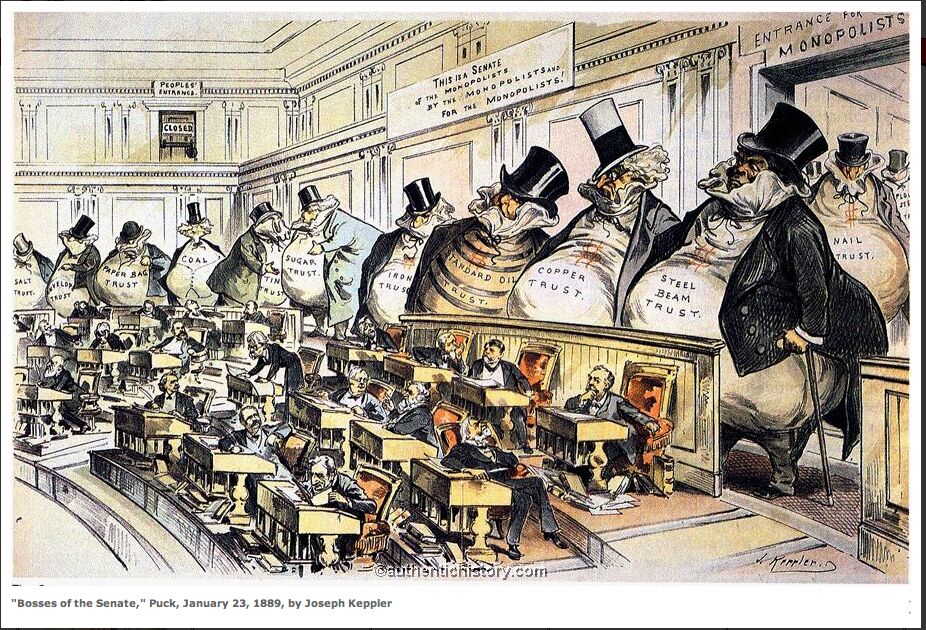Antitrust laws are laws in the United States that allow the government to prohibit mergers or acquisitions that are likely to lessen competition. They were formed in response to Gilded Age titans of industry such as John Rockefeller, Cornelius Vanderbilt, and others who essentially dominated their industries and used predatory business practices to snuff out any competitors in their market. However, critics of anti-trust laws have argued that they have stifled business in recent decades due to a number of unintended consequences.
Antitrust laws allow the government to prevent mergers
Entire books have chronicled the damage that antitrust legislation has done to the economy and the grounds on which American businesses have been prosecuted. Among the rationales provided for employing antitrust legislation against a private company appeared in the case against ALCOA, namely United States v. Aluminum Company of America (1945). Now ALCOA was indeed a monopoly in the crude sense—it was the only supplier of primary aluminum. But it could not for that reason simply have charged whatever it wished for aluminum since abnormally high profits would have attracted competitors to the field and driven profits back down. (And contrary to what antitrust legislation seems to imply, there is no non-arbitrary way for an outside observer to determine how many firms should exist in a given industry.) In his decision against ALCOA, Judge Learned Hand declared:
It was not inevitable that it [ALCOA] should always anticipate increases in the demand for ingot and be prepared to supply them. Nothing compelled it to keep doubling and redoubling its capacity before others entered the field. It insists that it never excluded competitors; but we can think of no more effective exclusion than progressively to embrace each new opportunity as it opened, and to face every newcomer with new capacity already geared into a great organization, having the advantage of experience, trade connections and the elite of personnel.
ALCOA’s wickedness, according to this decision, came from its great skill and expertise in supplying its product. Alan Greenspan once remarked that the case against ALCOA revealed the true damage of antitrust legislation. Whatever destruction of wealth and efficiency it may have caused, whatever decrease in living standards it may have brought about, the worst aspect of antitrust law was that it led to “the condemnation of the productive and efficient members of our society because they are productive and efficient.”
Opponents claim that antitrust laws allow the government to be an instrument by which less competent firms petition the government to punish rivals they couldn’t outcompete in the marketplace. In its routine, the typical textbook rakes big business over the coals for its “greed.” But opponents to antitrust laws claim the real greed here is on the part of firms who want the government to punish and break up efficient firms that supply the goods people need at prices they can afford, all so that these complaining firms can survive and charge higher prices.
By the mid-twentieth century, the character of antitrust law had become apparent to at least a small segment of the public. Speaking of regulations in general, the Federal Trade Commission’s Lowell Mason declared: “American business is being harassed, bled, and even blackjacked under a preposterous crazyquilt system of laws, many of which are unintelligible, unenforceable and unfair. There is such a welter of laws governing interstate commerce that the government literally can find some charge to bring against any concern it chooses to prosecute. I say that this system is an outrage.”
Supreme Court Justice Robert H. Jackson remarked while head of the Justice Department’s Antitrust Division that “it is impossible for a lawyer to determine what business conduct will be pronounced lawful by the Courts. This situation is embarrassing to businessmen wishing to obey the law and to Government officials attempting to enforce it.” Longtime Federal Reserve chairman Alan Greenspan condemned antitrust legislation in no uncertain terms four decades ago:
It takes extraordinary skill to hold more than 50 percent of a large industry’s market in a free economy. It requires unusual productive ability, unfailing business judgment, unrelenting effort at the continuous improvement of one’s product and technique. The rare company which is able to retain its share of the market year after year and decade after decade does so by means of productive efficiency—and deserves praise, not condemnation. The Sherman Act may be understandable when viewed as a projection of the nineteenth century’s fear and economic ignorance. But it is utter nonsense in the context of today’s economic knowledge…The entire structure of antitrust statutes in this country is a jumble of economic irrationality and ignorance.
Cite This Article
"Antitrust Laws Allow the Government to Prevent Mergers" History on the Net© 2000-2024, Salem Media.
May 3, 2024 <https://www.historyonthenet.com/antitrust-laws-allow-government-prevent-mergers>
More Citation Information.

